A newspaper advertisement for an Uber Technologies Inc stock sale was juxtaposed on Wednesday with a report that the ride-service provider had covered up a data hack – something of a metaphor for Uber, a company with boundless investor interest, but whose penchant for rule-breaking has led to a series of scandals.
The stock sale advertised in the New York Times will enable Uber [UBER.UL] investors to sell their shares to Japanese investor SoftBank, a critical deal for the company whose problems included building software to spy on competitors and to evade regulators and being investigated in Asia for paying bribes.
Uber on Tuesday said that it had paid hackers $100,000 to destroy data on more than 57 million customers and drivers that was stolen from the company – and decided under the previous CEO Travis Kalanick not to report the matter to victims or authorities. Uber was first hacked in October 2016 and discovered the data breach the following month.
Chief Executive Dara Khosrowshahi, who took the helm in August with the mission of turning around the company and overhauling its culture, acknowledged in a blog that Uber had erred in its handling of the breach. (ubr.to/2AmxlQt)
The timing of the disclosure could hardly have been worse.
The company is trying to complete a deal with SoftBank Group Corp (9984.T) in which the Japanese firm would invest as much as $10 billion for at least 14 percent of the company, mostly by buying out existing shareholders. SoftBank is advertising to find shareholders who want to sell.
Uber last month announced a preliminary deal for the SoftBank investment.
One question is whether SoftBank will now try to alter the price of the deal. One source familiar with the matter said SoftBank is planning to stick to its agreement to invest in Uber but may seek better terms. SoftBank has not yet made a final decision on whether to renegotiate, the source said.
Another question is the future of Kalanick, the co-founder who led Uber to becoming a global powerhouse but did so with aggressive and controversial tactics. He was forced out by investors in June who feared his leadership style would damage the company, although he stayed on the board and remains a significant shareholder.
source: Reuters


